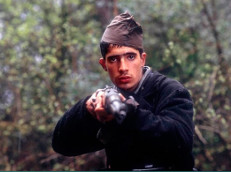This week’s reading, Soldiers of Salamis by Javier Cercas, was a long but entertaining read. The three parts and the switch between fact and fiction made it stand out from the previous novels we have read.
The fictional Cercas describes his growing fascination with the story in the first part when he learns about the night Sánchez Mazas is to be executed in the forest, and the Republican soldier who hunts for him amongst the trees finds in him yet turns away and lets him live. The second part tells the story of Mazas before his capture and intended execution. The third part is more fiction, where the journalist Cercas is determined to seek out the Republican solider who let Sánchez Mazas go free. These three parts and the switch between fact and fiction, although confusing, made me an attentive reader and helped me remain interested through this long read.
This book had a lot to do with history and took place during the Spanish Civil war. I don’t read many books about war or know much history about the context of this book, so all the content was new. Still, with the book switching between fact and fiction, it had me at parts confused or searching things up to put them in the proper context of the book. However, after reading books that are so different from what I normally read during this class, I have been made more open as a reader and it has also become a learning experience.
Getting closer to the end of this term, it’s hard not to create connections with the past readings. It was interesting to see Bolano make an appearance in the last section of the book, it definitely made reading his name more interesting after reading Amulet last week. Also, memory again was a huge theme in this novel and is a theme that has been brought to attention in most of the books we have read so far. From coming across this theme of memory quite a lot this term, it is interesting to compare and contrast how each author interprets memory in the novels. For W., we are told the memory of childhood can go on affecting life. For Amulet, we are shown the memories of how a single instance of trauma can affect memory and the future. Then in Soldiers of Salamis, we are seeing how memories can be formed by other people’s recollections.
My question for the class is: How do you think the authors in our previous readings interpret memory in comparison to Cercas?
Posted in Blogs, Cercas | Tagged with Fact, fiction, history, memory, war
This week’s reading, Soldiers of Salamis by Javier Cercas, was a long but entertaining read. The three parts and the switch between fact and fiction made it stand out from the previous novels we have read.
The fictional Cercas describes his growing fascination with the story in the first part when he learns about the night Sánchez Mazas is to be executed in the forest, and the Republican soldier who hunts for him amongst the trees finds in him yet turns away and lets him live. The second part tells the story of Mazas before his capture and intended execution. The third part is more fiction, where the journalist Cercas is determined to seek out the Republican solider who let Sánchez Mazas go free. These three parts and the switch between fact and fiction, although confusing, made me an attentive reader and helped me remain interested through this long read.
This book had a lot to do with history and took place during the Spanish Civil war. I don’t read many books about war or know much history about the context of this book, so all the content was new. Still, with the book switching between fact and fiction, it had me at parts confused or searching things up to put them in the proper context of the book. However, after reading books that are so different from what I normally read during this class, I have been made more open as a reader and it has also become a learning experience.
Getting closer to the end of this term, it’s hard not to create connections with the past readings. It was interesting to see Bolano make an appearance in the last section of the book, it definitely made reading his name more interesting after reading Amulet last week. Also, memory again was a huge theme in this novel and is a theme that has been brought to attention in most of the books we have read so far. From coming across this theme of memory quite a lot this term, it is interesting to compare and contrast how each author interprets memory in the novels. For W., we are told the memory of childhood can go on affecting life. For Amulet, we are shown the memories of how a single instance of trauma can affect memory and the future. Then in Soldiers of Salamis, we are seeing how memories can be formed by other people’s recollections.
My question for the class is: How do you think the authors in our previous readings interpret memory in comparison to Cercas?
Posted in Blogs, Cercas | Tagged with Fact, fiction, history, memory, war

